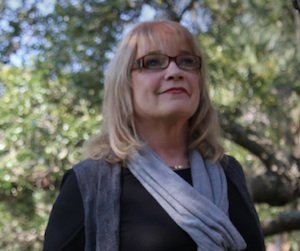Join a community of readers who are committed to Jewish stories
Sign up for JBC’s Nu Reads, a curated selection of Jewish books delivered straight to your door!
 Every author has strange questions thrown at them with the subtlety of a shofar blast. Asked if my husband was black, I felt as if a loud, shattering noise erupted just behind me. The words echoed inside my head, crashing into each other. I contemplated whether or not I’d heard right, and then with unadorned eloquence, I responded: “No.” The conversation was a phone interview, but I’m sure the questioner’s face screwed up in confusion. He pressed on. “Well,” he said, dog with a bone like, “do you have black people in your family?” I considered my beautiful, mixed race great niece. “Doesn’t everybody these days?” I asked, which seemed to put the question to rest.
Every author has strange questions thrown at them with the subtlety of a shofar blast. Asked if my husband was black, I felt as if a loud, shattering noise erupted just behind me. The words echoed inside my head, crashing into each other. I contemplated whether or not I’d heard right, and then with unadorned eloquence, I responded: “No.” The conversation was a phone interview, but I’m sure the questioner’s face screwed up in confusion. He pressed on. “Well,” he said, dog with a bone like, “do you have black people in your family?” I considered my beautiful, mixed race great niece. “Doesn’t everybody these days?” I asked, which seemed to put the question to rest.
Our conversation improved from there on, but its subtext has plagued me ever since. Over the course of three novels, Home in the Morning, One More River, and Marching to Zion, I’ve written about the confluence of the African American and Southern Jewish experiences throughout the 20th century. In each of my novels there are strong interracial friendships and affairs of the heart, arguably most powerfully in Marching to Zion. So the subtext of that question, Is your husband black? was clearly: “Why do you care so much about black people?”
The French have a saying to cover the phenom of discovering the perfect rejoinder to an unexpected question that’s struck you dumb: Le bon mot d’escalier. Translation: that perfect retort that hits you after the disastrous dinner party when you’re on your way down the stairs and out the door. I’ve had a few since that interviewer stunned me. Examples:
“Is your husband black?”
(a) “I never asked.”
(b) “Not this one. But I’m really hoping the next one will be.”
© “He wasn’t when I left the house.”
I was in a situation where I was required to be polite – authors who aren’t Norman Mailer need to keep smiling – or I might’ve been combative. In the nicest possible way. I might’ve said: “Is that a prerequisite for a Jewish woman to care about/write about African Americans?” and watched where that led. Or I could have told him the truth. When I started writing in a Southern meme, about race relations, about the New South vs. the Old South, about American liberty, who gets it and who doesn’t, I was writing to Northern Jews about Southern Jews, to rescue the mindset of my Northern cousins from the cultural trap of Hollywoodthink on the history of Jews in the South, on what the South is like today, and how the races relate. To my surprise, I discovered a whole crop of African American characters had been sleeping in my brain, waiting for the wake-up call. I fell in love with them. So did my readers. My thoughts deepened. I recognized where the African American and Jewish experiences meet, echo. Those points of communality – and dissonance — became my new focus.
Read more about Mary Glickman here.
Born on the South Shore of Boston, Mary Glickman is the prolific author of Southern Jewish historical novels, including National Jewish Book Awards Finalist in Fiction’s One More River and An Undisturbed Peace, listed by Southern Living as a best novel of 2016. Ain’t No Grave is her sixth novel. She lives on Wadmalaw Island, SC, with her husband.